- Home
- Gordon Korman
Masterminds Page 2
Masterminds Read online
Page 2
“From school,” I reply. “I’m in eighth grade, Dad. We know about armies. We even know they have to fight wars sometimes.”
He sighs. “I suppose. We’re citizens of the larger world too—not just our own town. I wish that everybody could share the life we have here.”
“Tell me about it,” I agree. “Hey, Dad, why do the Purple—the Surety have their own helicopter?”
“It belongs to the factory. We’re fortunate to have a company like the Plastics Works that looks after us so well. A lot of communities our size don’t enjoy our resources.”
“Yeah,” I persist, “but why do they need it here? We’re completely safe.”
He looks surprised. “Well, they just saved your bacon, didn’t they? In a big city, that helicopter might be needed for police surveillance. Here we have the luxury to use it to help people. It’s just another thing that makes Serenity such a special place, don’t you agree?”
But for once, I’m not sure whether I agree or not, because the memory of the chopper triggers other images: rough hands hauling me aboard the craft; a stifled “Hey!” from Randy, hitting the deck beside me; the sound of the bikes being crammed into the cargo hold; a dizzying takeoff, which finally brings up lunch; Serenity viewed from high above, growing steadily larger as we come in for a landing.
Then, pounding feet, a babble of anxious voices. Purple People Eaters, Dr. Bruder, my father, all talking at once.
“Here!”
“Hold the stretcher steady!”
“Quickly!”
“Put him out!”
The needle pierces my arm and I’m fading, but I can hear a response. “Yes, Mr. Hammerstrom.”
Hammerstrom?
At that point, the sedative takes effect and everything goes black.
Dad kisses my forehead. That doesn’t happen very often, proving how much this incident must have shaken him. “Now get some rest, Eli. Dr. Bruder wants to observe you for a couple of days.”
I know I should just be grateful to be alive. But the curiosity is boiling inside me and I can’t help it. “What’s Hammerstrom?”
He’s almost gone, but the question freezes him in the doorway. “I beg your pardon?”
“When they took me out of the helicopter, someone mentioned Hammerstrom.”
“One of the Surety goes by that name,” Dad replies.
I try not to smile. Wow, there’s a Purple People Eater named Hammerstrom! I’ve got to tell Randy!
Although everybody knows everybody in Serenity, that doesn’t extend to the Surety. They keep to themselves, which makes them kind of nameless and faceless. You see them around town, but the only time you ever get close is on Serenity Day, for the annual Surety-versus-Plastics-Works tug-of-war. That’s also when they do their drill team parade, which looks like someone spilled grape juice on the Grenadier Guards in front of Buckingham Palace.
“Now put it out of your mind,” my father continues. “You’re safe and it’s all over.”
It’s meant to be soothing, but it sounds a little like an order.
I resist a wild impulse to snap a salute.
2
AMBER LASKA
THINGS TO DO TODAY (UNPRIORITIZED)
•Piano Practice (1.5 hours)
•Ballet Practice (1 hour)
•Math Test Corrections (to bring up grade from 94)
•Meditation (need new mantra—download English-Sanskrit translation app)
•Make Farewell Card for Randy (optional)
•Work on Book with Tori
•Work on Serenity Day Project with Tori
•Sleepover at Tori’s (unconfirmed; Tori might sleep over here)
I frown at the list, and then change optional to mandatory. Maybe Randy’s not my favorite person—I think he’s a troublemaker. But I feel terrible for anybody who has to move away from Serenity. No other place could ever be as good.
The scene where he breaks the news keeps replaying itself in my head. He’s being sent to live with his grandparents in Colorado.
“You mean”—my mind can barely take it in—“you’re leaving Serenity?”
He nods grimly. “They have a small farm, and they’re getting older, so they need some help.”
He’s devastated. And what about Eli? He’s still in the health clinic from that weird accident. I shudder just thinking about it. You’re shut away with no visitors, and when you finally get out, the first thing you hear is that your best friend is moving away? I can only imagine what it would be like to lose Tori, who I’ve seen every single day as long as I can remember.
“Can’t your grandparents hire somebody?” Tori asks.
Randy shrugs. “My mom says they can’t afford to. It’s just a small place.”
We stare at him like he’s speaking a foreign language. None of us has ever met anybody with money problems. The plastics factory is always busy, and everyone who wants a job has one. We’re not rich in Serenity, but we’re all really comfortable. I mean, we know about poor people, but that kind of thing happens in other places. It’s the saddest thing I’ve ever heard—not being able to afford a house or even food to eat.
One time Tori and I saw this movie where a family gets their power shut off because they can’t pay their electric bill. It’s hard to imagine that situation in Serenity. Maybe you don’t pay your water bill so you can’t fill up your pool? But here, there’s plenty of money to go around, so everybody pays their bills. It’s just another reason why I’d never leave Serenity—until college, of course. We’re too tiny to have our own university—though I wish we did. Even then, I intend to stay as close to home as possible, at the University of New Mexico at Taos. I’m careful to keep my interests and hobbies limited to things you can major in at Taos, like English, music, and dance. That’s why I gave up learning Chinese last year. No sense in wasting my time on something that isn’t going to go anywhere.
It seems to me that they’re ignoring an obvious solution. “Why don’t your grandparents sell their farm and come to live here?”
He looks miserable. “It’s already decided. I’m going.”
“Poor you,” laughs Malik Bruder, the doctor’s son. “You might actually have some fun in the big bad world out there.”
“Can you be serious for once?” I’m so not in the mood for this. “What do you consider fun? Living in a crumbling, dangerous city where people are packed in like sardines?”
Malik smirks at me. He always manages to look like nothing bothers him. “You’d be surprised, Laska.”
“And you know so much about the world,” I shoot back. “With your C-plus average and your interest in—” I pretend to rack my brain. “Oh, right—absolutely nothing!”
He seems amused. “Have you ever been anywhere but here?”
“You haven’t either.”
“True,” he admits. “But the minute I’m old enough, I’m out of here. NYC all the way, baby!” He always calls it by its initials—en-why-see.
“Don’t say that!” pleads Hector Amani, Malik’s number one fan. “It’s not like Serenity out there. People take advantage of you!”
Hah. Malik has made an art form out of strong-arming Hector into doing things for him. When it comes to taking advantage, NYC would have a hard time coming up with someone as good as Malik.
Malik shifts his gaze over to Hector. “You’re perfect for this place. Me? I’m going to see the world.”
“You can waste your whole life wandering only to find that what you’re searching for is right in your own backyard,” I return. I didn’t make that up. That’s what it says on the gazebo in Serenity Park. It’s kind of the town motto. Tori and I are working on a picture book based on it, called Your Own Backyard. My mom is a teacher at the school, and she’s going to set it up so we can read it to the lower-grade kids when we’re done. If it’s any good, naturally.
By this time, Randy looks terrified and I feel guilty. Here we are, talking about how the outside world is unlivable, and that’s where h
e’s going. But what can we say? That it’s just as good as Serenity? That’s another thing outsiders do that we don’t. They lie.
Malik notices it too. “Trust me, Randy. You’re the lucky one. If the rest of the world is so bad, how come so many people live there? There are, like, seven billion of them, and only 185 of us. Case closed.”
Malik is infuriating. But one of the things we learn in school is that anger is the emotion of a lesser person. So I just smile. “You know it doesn’t work that way.”
“How do you know it doesn’t?”
Before I can answer, my mom rings the handbell to call us in for math, which is our first afternoon class except on Tuesdays, when we have science, and Thursdays, when we have Contentment. It’s a full schedule when you add in social studies, Meditation, and gym. We’re in the middle of the water polo unit now, because Serenity Day is coming up. We always cap off the celebration with the big game. It’s my favorite holiday of the year.
I lead the group back into the building. When your mother is the teacher, you have to be just a little better than everybody else. It’s a lot of pressure to be the best behaved, the most involved, and to get the highest grades. That’s why I make lists of everything I need to do. It helps me stay focused—control is key.
Example: When we reach the classroom, there’s always a basket of desserts on the teacher’s desk—cookies, cupcakes; today it’s donuts. We’re supposed to take only one, but it’s on the honor system. Mom’s still outside, so nobody’s watching us.
I’m two pounds off my goal weight, so I don’t take any. Tori helps herself to one, like most of the kids. Hector takes a donut, and, when nobody’s looking, sneaks another half.
Malik? He inhales about four. He’s proud of himself too—standing at the basket, grinning smugly, lips smacking, icing staining his fingers, when Mom comes in for the afternoon. He’s practically daring her to call him out.
Malik thinks he’s so cool because he breaks rules. But he’s not as smart as he thinks he is—especially when it comes to the world outside Serenity. In fact, I know a lot more about it than he does.
It happened a few months ago. Tori and I were in the park working on Your Own Backyard. She had to go, but I stayed to practice my pliés, since I was twenty minutes short on ballet that day. Control, remember?
Anyway, I was right by the Serenity Cup, which is this huge silver trophy on permanent display on a pedestal in the center of the park. It’s our town’s pride and joy, presented by President Roosevelt way back when Serenity was founded in 1937. It sits in a Plexiglas case, and nobody ever walks through the park without checking it out, even though we’ve all seen it a million times.
So that day, I look at it for time number a million and one, and there’s something I’ve never noticed before—a padlock through a little hasp in the corner of the case.
Then I spot the work crew—two men in heavy boots. One is up a ladder, and the second is holding it steady. They appear to be snipping branches off an overgrown sycamore tree. Here’s the thing, though: they’re not from here. Everybody in Serenity knows everybody else, except maybe some of the Purple People Eaters. But I’ve never seen these guys before.
Sure enough, there’s a pickup truck parked by the side of the roadway. Ray’s Tree Service, Taos, New Mexico is stenciled on the door. I have an astounding thought! Did they lock the case because they’re afraid one of these strangers might steal the Serenity Cup? We’ve all heard the horror stories about other places, but this is the first time it’s ever crossed my mind that outsiders might bring their dishonest ways here.
Even though I’m nervous, I’m also a little intrigued. Meeting new people doesn’t happen very often. There are only 184 possible choices, and I already know almost all of them.
I decide to go over and introduce myself. “Hi, I’m Amber.”
One says “Hi” back. The other tells me, “We’re working here, kid,” not in a mean way, but the way adults sometimes talk when they’re too busy to be bothered with you. I guess I look a little wounded, because he adds, “Watch your head. There are branches coming down. I wouldn’t want you to get hurt.”
“Oh, right. Thanks.” I suppose it’s nice of him to look out for my safety.
I retreat a few steps toward the truck, and that’s when I notice the newspaper on the driver’s seat. It’s something called USA Today. A newspaper for the whole country? People in Serenity read the Pax, which is published right here. This paper must be big in Taos, and maybe other places, since it says USA.
Suddenly, I’m staring at the headline:
ACTOR’S DEATH RULED MURDER
I turn to the tree guys. “What’s murder?”
They stare at me like I’m some exotic cockroach that just crawled up out of the ground. The ladder holder says, “Seriously?”
“I’ve never seen that word before,” I explain. “What does it mean?”
The man in the tree snorts a laugh. “Murder is having to prune branches on a hot day.”
“Tell me about it!” his partner chimes in.
I can tell they’re laughing at me, and I’m embarrassed although I don’t really know why, so I change my tactic. “Can I have your newspaper?”
“Oh, sure, kid. Knock yourself out. And while you’re at it, you’d better get yourself a dictionary.”
I reach in the driver’s side window, and pick up the USA Today. My eyes are drawn back to the lead story:
It began as a grisly mystery: bloodstained walls in a Hollywood hotel suite; a Browning pistol still clutched in the victim’s limp hand; a famous face contorted in death . . .
“Heads up!”
A leafy branch hits the ground at my feet, and I scramble out of there, calling, “Thanks for the paper.” I can feel the newsprint crackling in my hands, almost as if there’s an electric current running through it. It’s clear to me that I’m holding something powerful and important, although I have no idea how I know this.
When I get home, I hide the USA Today in the garage between the spare air-conditioner filters. I’m not sure why I don’t show it to my parents, especially my mom. We’re really close, since I see her all day at school, and then all night at home. I don’t even tell Tori, and we’re practically two halves of the same person. I know that keeping secrets is like chiseling at the mortar between bricks in a wall. But this feels different. This is uniquely mine. So I have this urge to keep it for myself.
Over the next few days, I read that paper from cover to cover, soaking up every word. Some of the stories are the same as what the Pax prints—stuff about the president, and the sports scores. But that’s where the similarity ends. Put it this way: I know what murder is now. They also call it homicide—another word I never heard before.
Our parents are always reminding us how lucky we are to be spared the kind of problems they have in other places. But that’s not the same as seeing it spelled out in black-and-white—reading the descriptions of the crime scenes, hearing about the victims and their poor families, following the police officers who make the arrests, and the court cases where criminals are brought to justice.
And it’s not an occasional thing either. I count seven people dying because of murder, just in one USA Today! There are even more robberies—and sometimes the murders and the robberies happen together. There are other things we never read about in the Pax—things like wars, kidnappings, riots, and acts of terrorism.
Every time I put my USA Today back in its hiding place, my head is spinning with more questions. What kind of people would do such horrible things? There’s nobody like that in Serenity. What if murder comes here? Is that why there are so many Purple People Eaters, and why they have their own helicopter—to protect us from all this?
I calm myself down with a little meditation. It’s more proof that our parents did the right thing by raising us here, where we’re safe.
One thing bothers me, though. Why doesn’t the Pax print the bad stories that are in USA Today? Is it because we don�
�t have to worry about things like murder? Just because we live here doesn’t mean we shouldn’t know about the outside world. What about someone like poor Randy? When he gets to his grandparents, will he be ready?
I agree that USA Today is upsetting, but it feels really honest.
At dinner that night, my mother brings up the subject of Randy moving to Colorado. “How did the kids react?” she asks. “It must be hard to lose a friend you’ve known for so long.”
“Yeah,” I agree. “It’s murder.”
My father drops his fork with a clatter.
Mom stares at me. “Where would you pick up a horrible word like that?”
“From the newspaper.”
Dad frowns. “Don’t be dishonest, Amber. The Pax would never—”
“It wasn’t the Pax. It was in USA Today.”
“But how—?” For an instant, my mother’s voice rises sharply. Then she catches herself, and when she speaks again, she sounds calm. “I’m a little—surprised that you found an outside newspaper. The Pax is all we read around here.”
“There were these tree trimmers in the park.” It feels good to get it off my chest after so long. “They gave it to me.”
“When was this?” my father probes.
“A pretty long time ago.”
My parents share a meaningful look. I’m thinking: Are they mad at me? I never actually lied, but it’s pretty obvious that I didn’t go out of my way to tell them about it.
But no. Mom’s not angry, just interested. “Well, did you learn anything from it?”
I nod. “I learned how lucky we are to live in Serenity.”
THINGS TO DO TODAY (UNPRIORITIZED)
•Piano Practice (1.5 hours)
•Ballet Practice (1 hour)
•Finish Contentment Essay
•Tell Tori about USA Today
It’s funny—once Mom and Dad know about my newspaper, it seems crazy that I never told Tori about it. What could I have been thinking? It just confirms what we learn in Contentment—that the mind has a way of tricking you into thinking you’re doing the right thing when you’re not.

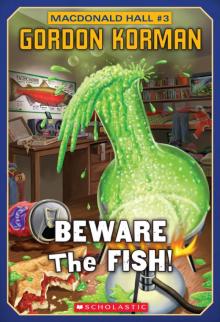 Beware the Fisj
Beware the Fisj Slacker
Slacker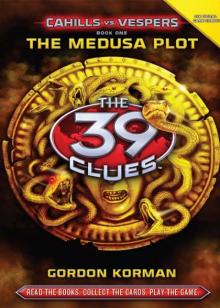 The Medusa Plot
The Medusa Plot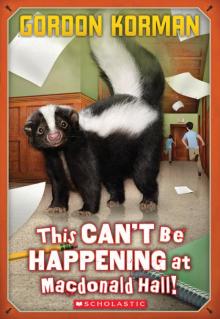 This Can't Be Happening at MacDonald Hall!
This Can't Be Happening at MacDonald Hall!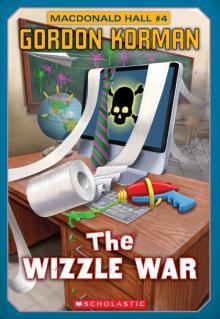 The War With Mr. Wizzle
The War With Mr. Wizzle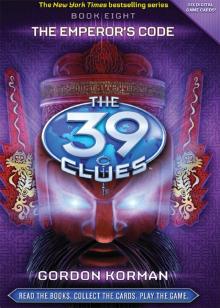 The Emperor's Code
The Emperor's Code Zoobreak
Zoobreak The Danger
The Danger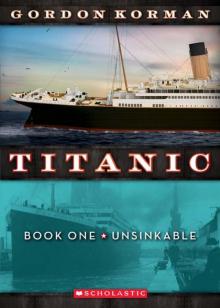 Unsinkable
Unsinkable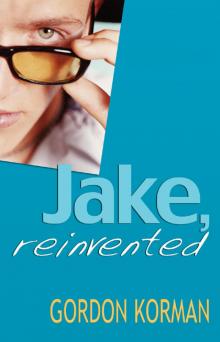 Jake, Reinvented
Jake, Reinvented No More Dead Dogs
No More Dead Dogs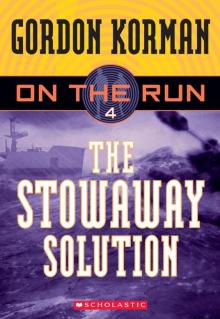 The Stowaway Solution
The Stowaway Solution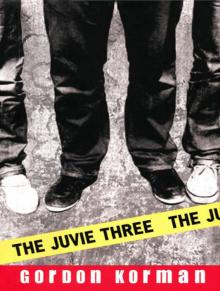 The Juvie Three
The Juvie Three The Climb
The Climb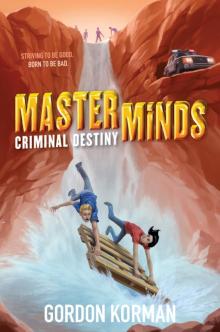 Criminal Destiny
Criminal Destiny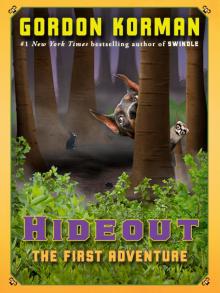 Hideout: The First Adventure
Hideout: The First Adventure Flashpoint
Flashpoint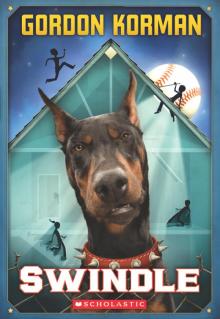 Swindle
Swindle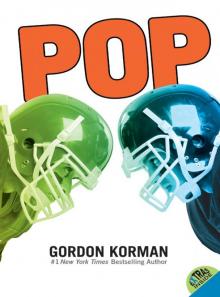 Pop
Pop The Rescue
The Rescue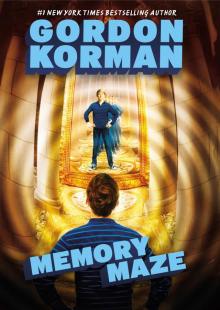 Memory Maze
Memory Maze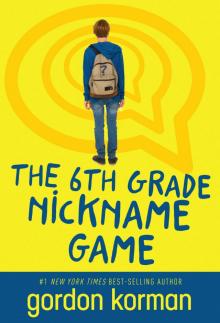 The Sixth Grade Nickname Game
The Sixth Grade Nickname Game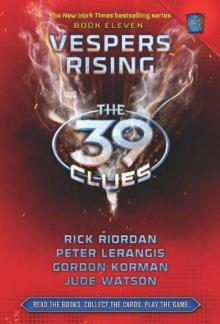 Vespers Rising
Vespers Rising Collision Course
Collision Course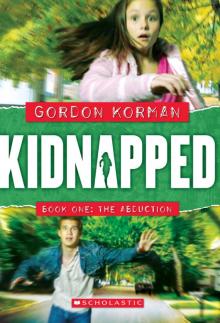 The Abduction
The Abduction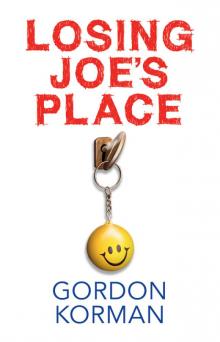 Losing Joe's Place
Losing Joe's Place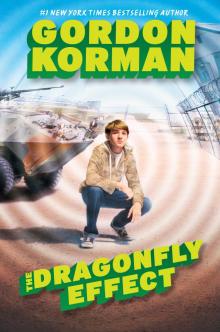 The Dragonfly Effect
The Dragonfly Effect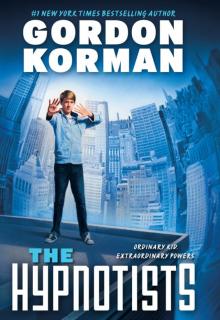 The Hypnotists
The Hypnotists Survival
Survival Lights, Camera, DISASTER!
Lights, Camera, DISASTER! Payback
Payback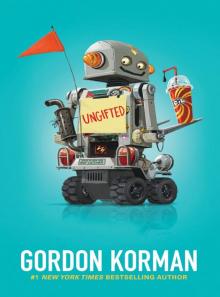 Ungifted
Ungifted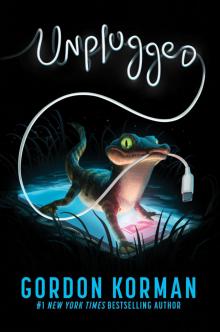 Unplugged
Unplugged Framed
Framed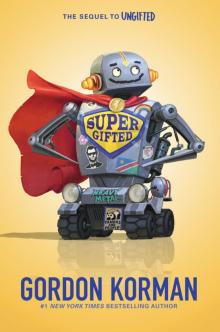 Supergifted
Supergifted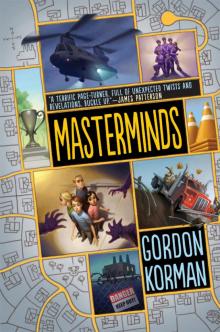 Masterminds
Masterminds Jackpot
Jackpot Don't Care High
Don't Care High The Deep
The Deep Go Jump in the Pool!
Go Jump in the Pool! The Contest
The Contest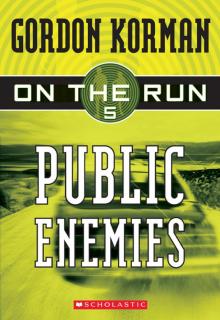 Public Enemies
Public Enemies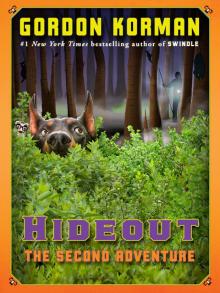 Hideout: The Second Adventure
Hideout: The Second Adventure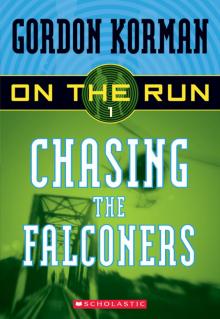 Chasing the Falconers
Chasing the Falconers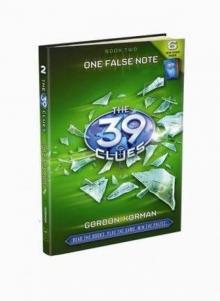 One False Note
One False Note Shipwreck
Shipwreck Jingle
Jingle Unleashed
Unleashed Son of the Mob
Son of the Mob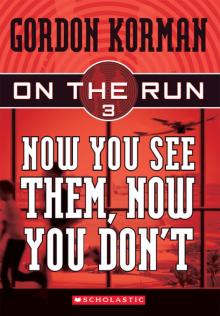 Now You See Them, Now You Don't
Now You See Them, Now You Don't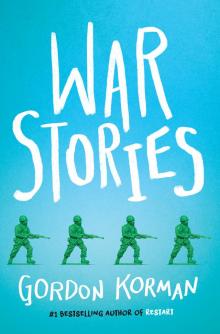 War Stories
War Stories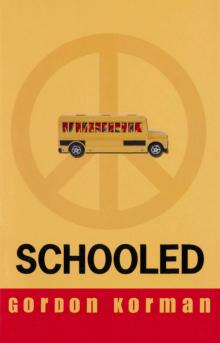 Schooled
Schooled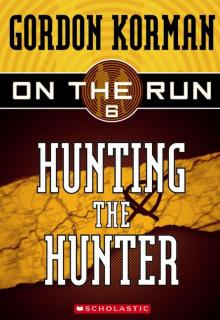 Hunting the Hunter
Hunting the Hunter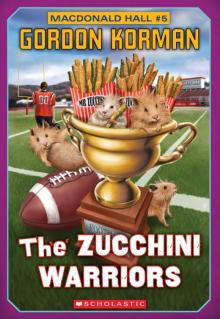 The Zucchini Warriors
The Zucchini Warriors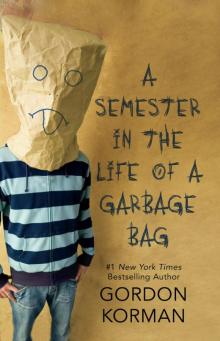 A Semester in the Life of a Garbage Bag
A Semester in the Life of a Garbage Bag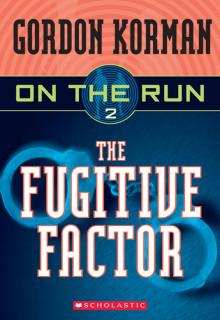 The Fugitive Factor
The Fugitive Factor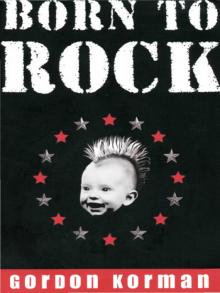 Born to Rock
Born to Rock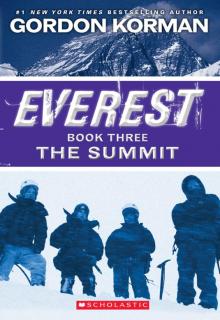 The Summit
The Summit Showoff
Showoff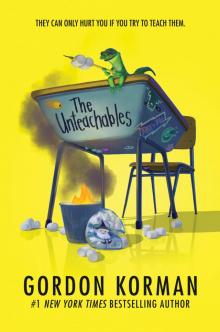 The Unteachables
The Unteachables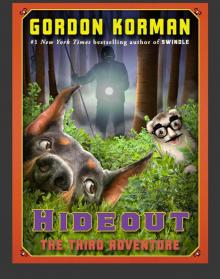 The Third Adventure
The Third Adventure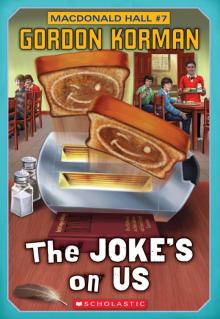 The Joke's on Us
The Joke's on Us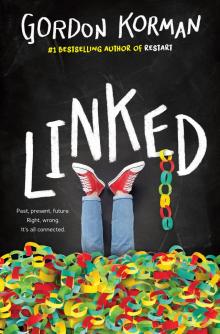 Linked
Linked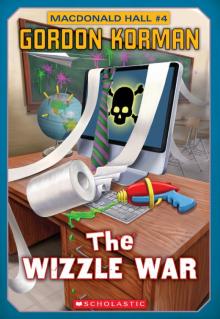 The Wizzle War
The Wizzle War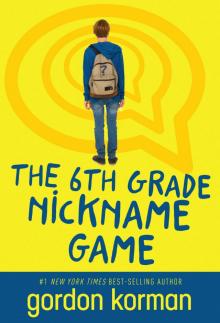 The 6th Grade Nickname Game
The 6th Grade Nickname Game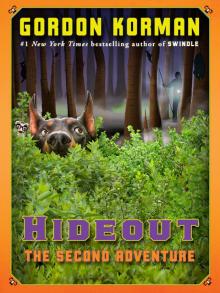 The Second Adventure
The Second Adventure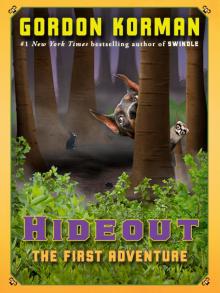 The First Adventure
The First Adventure![39 Clues : Cahills vs. Vespers [01] The Medusa Plot Read online](http://i1.bookreadfree.com/i2/04/10/39_clues_cahills_vs_vespers_01_the_medusa_plot_preview.jpg) 39 Clues : Cahills vs. Vespers [01] The Medusa Plot
39 Clues : Cahills vs. Vespers [01] The Medusa Plot